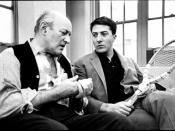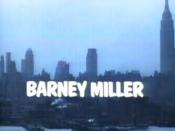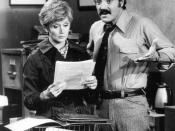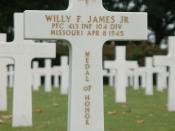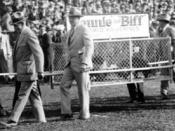The play "Death of a Salesman" is written "with all his faults-his weakness, his density, his petty irritations and his self-delusions"æ" denotes Robert Hogan (216). The play is about Willy Loman, a salesman whose soul is lost in a hallucination and cannot distinguish between reality and illusion. Willy is incompetent to deal with society due to his feeling in a loss of identity and is unable to recognize himself. Upon reading Harold Clurman's 1949 critical essay, he denotes the play as "documented history of our lives" (26). Although, I agree that blind faith of the American dram may be true to some readers, it also appears that Willy, the fictional character, can perhaps speak for Miller by allowing his protagonist speak for him.
"I am tired to death claims Willy (Beaty and Hunter, 1871), as he arrives home from a business trip. From the beginning of the play Miller attempts to influence the reader by portraying a rundown, struggling Willy who hallucinates in time of yore.
Continuously throughout the play Willy slips to the past, and in one of these scenes Ben, Willy's past brother, appears to him and Willy asks him ""æwhat's the answer"æHow did you do it?" (1890). Willy's misguided notions of success results in disillusionment and ultimately failure in his life. Through most of his life, Willy blindly pursues success in his career and his values have been to ""æbe liked and you will never want" (1883). But Willy cannot fulfill this philosophy and therefore lives in a false illusion.
In the play, Miller gives special attention in describing Willy's home. Could these images be intended to reveal Willy's life? While Willy is irritably seating at his he says ""æthey boxed us in here"æ.bricks and windows, windows and bricks" (1874). The box depicts Willy's life trapped in, and the heavy bricks connotes the weight (years) he carries with him. The window manifests the "light" an opportunity to reach his freedom and distinguish illusion from reality.
The next scene is when Willy wants to plan seeds in the backyard of his fenced-in house garden however; the garden won't grow due to the absence of the sun. The sun signifies life, a meaning to this world and nurtures the soul. When Willy got inspired by Biff's opportunity to borrow money from his former employer, Bill Oliver, Willy begins to see hope and says, ""æ and the sun, the sun all around him" (1902). The sun is symbolic of Willy's strength""no sun""no hope for life.
Hence, Willy lives in a world of darkness where he can't escape and calls out ""æwhere are you guys, where are you"æthe woods are burning"æI can't drive a car" (1887). It seems that Willy is frantically seeking to be rescued, his life is in danger of burning up and he can't get out, he desires to escape but he just can't. His son, Biff attempts to rescue Willy by speaking only the truth to him and help Willy recognize his real identity but Willy constantly refuses to face reality. Unfortunately, not only is Willy's life ruined in failing to identify his true identity, his two sons, Biff and Happy, are victims of his ignorance. The brothers suffered Willy's sin: Biff, the eldest says ""æ I'm mixed up very bad" (1877), while conversing with Happy of the 20 or more jobs he's held. In addition, Biff's image and respect for his father is shattered. Hence, Biff feels betrayed by his Dad because all his life Biff tried to live according to Willy's values and expectations, and from that period forward, at age17, Biff also becomes a lost soul, "He'd given up his life," comments Bernard (1915).
Biff tried to seek satisfaction as a course of a lady's man. He is continuously ignored by his father and overshadowed by Biff. In trying to get his parents attention Happy repeatedly mentions to his parents, "I'm getting married"æ" (1937), without any intention of such action. While not "realistic," nonetheless, Happy's ideals have already been tarnished by embracing Willy's goals and regretfully his life will turn out to be a disgrace as Willy's turned out. Happy has truly convinced himself that he can ""æcome out number-one man" (1939).
Indeed, the play has immense effect because one can recognize itself in some parts of the play and it wins our sympathies. It appears that Miller has portrayed some experiences of his own childhood in this drama play. We learned Willy lost his job and emotionally informs Biff "I was fired today" (1922). Miller's father ""æsome of a prosperous businessman who lost his wealth during the Great Depression" (Discovery Biography) lost his job, as well. It is difficult to argue that Miller's play may represent some images of his emotions during his youth and the "underlying struggle" similar to his protagonist who says, "The world is an oyster, but you don't crack it open on a mattress" (1887).
One cannot help notice some of the relationships the play symbolizes Miller's struggle in his "academic pursuits" and the rejection from the University of Michigan (Discovering Biography). Miller soon succeeds in life and overcomes the ""æmystery" (1887), and the ""æsecret" (1914). As Ben, his fictional character says, "I walked into the jungle, I was seventeen"æwhen I walked out I was 21" (1893). Miller continues his career writing "`social` play with the realism and intensity of psychological dramas that focus on the individual" (Discovery Biography).
